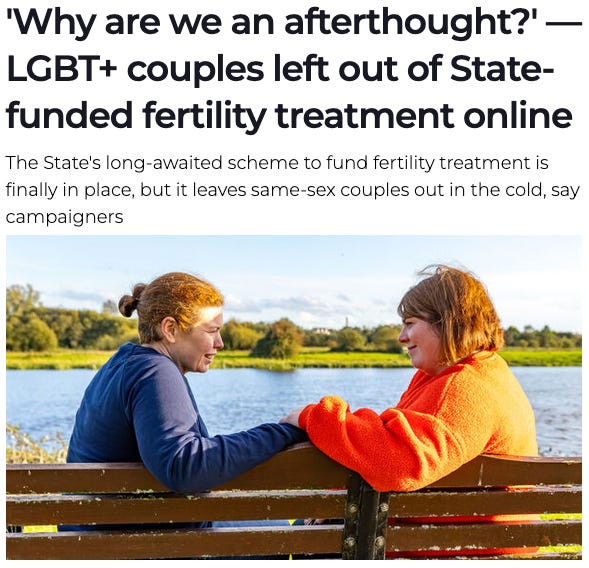Why I'm still writing about queer fertility issues
"The State shouldn’t choose to value, support and invest in one kind of family — the heterosexual couple — to the exclusion of everyone else."
Today, The Irish Examiner published a piece I’ve been working on over the last while. It’s about the State’s first funded fertility treatment and how it discrimates against queer people. The funding, which was warmly welcomed when it was announced in July, provides for one round of IVF (in-vitro fertilisation) or ICSI (Intracytoplasmic sperm injection) and up to three cycles of Intrauterine Insemination (IUI) to eligible couples.
In order to access funding, couples need to meet a number of eligibility criteria including:
Knowing the clinical cause of their infertility
Have a BMI (body mass index) between 18.5 and 30 (for the woman)
Be age 40 or under if you're a woman, or 59 or under if you're a man
Have never had IVF or have had only 1 (unsuccessful) round of IVF and have no unused embryos in storage
Not require donor gametes, either egg or sperm
This final requirement excludes (almost*) all same-sex couples.
I wrote about the discrimination inherent in the funding scheme when it was announced. My first draft was full of rage. How dare you exclude us? How is this legal? Who can we sue? As I revised the piece, I tried to edit out some of the fury. I wanted to write something that felt readable and measured. Something that might change somebody’s mind. Something that might actually get published.
I argued that the Government’s first step toward making fertility treatment more accessible shouldn’t be to exclude queer people. I pointed out that (almost) all same-sex couples who want to have children require medical intervention, but only a small proportion of straight couples do. I argued that, statistically, queer couples are more likely to experience poverty particularly lesbian couples who are twice penalised by the gender pay gap. I wrote about the discrimination these children face when they are born, how they often do not have the same legal relationships with both of their parents and how this impacts their ability to access medical treatment, foreign travel, tax and inheritance rights.
After my first piece was published, I didn’t plan to write more on the topic. I’ve been grappling with my own decisions in this area and know fertility can be a very painful topic for so many people. But the more I read about it, the more it bothered me.
It reminded me of the complicated, painful period immediately after my mother’s death. For those who don’t know (though I feel like I write about it all the time!), she was killed in a car accident when I was 19. She died intestate (i.e. without a will) and with young children. She was a single parent, our household’s only source of income, and when she died, our income stopped. Her death was not only emotionally devastating, but financially and legally disastrous. In the weeks after she died, I hired lawyers and began trying to navigate the legal mess she left behind. It wasn’t her fault. She had made an appointment with her lawyer to make a will, but died 3 days before she could.
It feels important to say that though I was broke during this time in my life, I was never poor1. My mother left me money which would eventually work its way through the legal process and land in my bank account. My memory is that it took 7 years. So while there were lots of cold, hungry nights, I knew that it wouldn’t last forever. We also came perilously close to losing our home. Writing this now, I shudder to remember how fragile life seemed back then, how it was only a matter of luck and timing that I had somewhere to sleep at night.
Eventually, the money came through and my life moved on. But I’ll never forget the moment the bottom fell out of my nice, middle class life. The feeling of being in legal limbo, of needing the protection of the law but being invisible to it. Stories like mine are, thankfully, quite rare. That kind of tragedy doesn’t happen to many people, but it happens to some. Being part of a tiny minority is little comfort as your life collapses around you.
4% of couples in Ireland are in same-sex relationships. I couldn’t find any data on how many of them have children, but even if the numbers are small, those children deserve to be protected by the law. Human reproduction is a complex area. We must respect the right to identity of donor conceived people. We must also recognise that there are many ways to conceive and raise children. The question is whether the State absorbs and legislates for this complexity, or whether it’s left to the children and their families to carry that burden.
Imagine a queer couple with a child. When one parent is away for work, the other parent (who is a legal stranger to the child) is caring for them. If the child has an accident (as children often do) and needs medical treatment their ‘legal stranger’ parent can’t consent to it. If the ‘legal stranger’ parent dies, their children can’t inherit their assets with the same tax arrangements as the children of heterosexual couples.
Some say that these things only matter when something goes wrong. But having experienced things going very, very wrong in my own life, that is little consolation to these families. I remember the moment I realised I needed a lawyer. My mother had been dead only a few hours and I knew I was in deep, deep trouble. It’s hard to quantify what that costs you - the financial cost, the time, the emotional drain, the feeling of suddenly being rudderless in the world, of existing in a legal blindspot. Imagine the burden on a couple, struggling first to conceive (without any funding from the State) and then raising a child in a heteronormative society. Imagine doing it if English isn't your first language. If you’re broke. If you’re in the middle of a mental health crisis.
The State shouldn’t choose to value, support and invest in one kind of family — the heterosexual couple — to the exclusion of everyone else. Many children of queer couples live in a legal blindspot everyday. They absorb the discrimination this government has written into the law and grow up understanding that they are different from their friends who were born to heterosexual parents.
Another facet to story is how the funding isn’t available to larger bodied women. I spoke with Jess Willow, a registered dietician and owner of Willow Nutrition, who specialises fertility nutrition and intuitive eating. I’ve written before about how BMI is a racist, inaccurate formula that was never intended to be used as a health metric. And of course, there are no weight restrictions on the male partner who’s seeking funding. You can read more about that in the piece itself.
There’s a particular pain that comes with realising the government can discriminate against you, without even a squeak of a backlash. There’s been no outcry. No consequences. Reporting this story, I was struck by how many people simply don’t know that this discrimination exists. The more reporting I did, the more I realised what I didn’t know. Like how straight couples can use donor gametes and simply not tell anyone. Nobody questions how their family came to be. But if you’re a queer couple, people ask questions. It’s a form of hetero-privilege for your family to exist without needing to be explained.
There is so much more to say. I’ve written almost 2,000 words and only scratched the surface. I hope you’ll read the piece published today and share it with a friend. (Or read my first piece, and share that with a friend.) The more people who know what’s happening, the sooner it’s likely to change.
To stay up to date on these issues, please follow Equality for Children and Irish Gay Dads. Ranae, from Equality for Children, is also an excellent follow on Instagram. I’m also grateful to the End Diet Culture advocacy group for the tweet quoted above, and their work on this area as well as Jess Willow, from Willow Nutrition. My deepest thanks goes to the women who shared their stories with me for this piece. Fertility and family-making is such an intimate, personal topic and I am very grateful for their openness.
*An important note on language
One of the challenges in writing about this topic is that there are many, many different kinds of queer couples. There are cis partnerships (either two men or two women) and there are partnerships made up of trans, non-binary and gender fluid folks. There are couples, throuples and other polyamorous relationships. There are folks on the ace spectrum, or who identify as intersex. The queer community is diverse, ever-expanding and requires careful, nuanced language.
Queer bodies often challenge cis-normative definitions of gender. A person can possess a uterus or sperm, and not identify along the cis-normative gender binary. Their understanding of their gender may be much more expansive than what the HSE guidelines expect.
Writing about this topic, I was struck by how often I wanted to say *all* queer couples. It's the journalist in me looking for a clear, declarative headline. I want to write *all*, even when it's more accurate to say 99%. Queer life demands more nuanced, thoughtful language and though I don't always get it right, I'm committed to trying.
Here’s a good definition of poverty, which is very different from my experience: “People are living in poverty if their income and resources (material, cultural and social) are so inadequate as to preclude them from having a standard of living which is regarded as acceptable by Irish society generally. As a result of inadequate income and resources people may be excluded and marginalised from participating in activities which are considered the norm for other people in society.”








Clare, I write about family-building generally, and what I call "the scenic path to parenthood" specifically -- stories of complications with the process, whether due to fertility challenges, pregnancy loss, or other factors like divorce. I think the topic of reproductive equity for queer couples is really important and one I'm passionate about myself as a straight-passing queer person. Would love to be Substack buddies as you continue to consider the forks in the road for yourself.
Great job on the article Clare! (It made me livid.) And further thanks for this more personal dive into it.